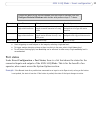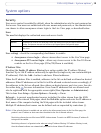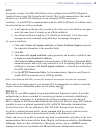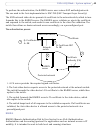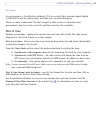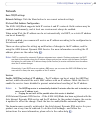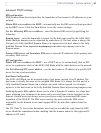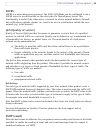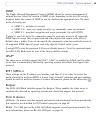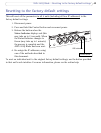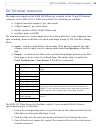
43
AXIS 243Q Blade - System options
Advanced TCP/IP settings
DNS configuration
DNS (Domain Name Service) provides the translation of
host names to IP addresses on your
network.
Obtain DNS server address via DHCP - au
tomatically use the DNS server settings provided
by the DHCP server. Click the View button to see the current settings.
Use the following DNS server address
- enter the desired DNS server by specifying the
following:
Domain name
- enter the domain(s) to search for the host name used by the AXIS 243Q
Blade. Multiple domains can be separated by semicolons (;). The host name is always the
first part of a Fully Qualified Domain Name; e.g. myserver is the host name in the Fully
Qualified Domain Name myserver.mycompany.com where mycompany.com is the
Domain name.
Primary DNS server and Se
condary DNS server- enter the IP addresses of the primary and
secondary DNS servers.
NTP configuration
Obtain NTP server address via DHCP - use
a DHCP server to automatically find an NTP
server to synchronize clock of the AXIS 243Q Blade with the other devices on the network
Use the following NTP server address - use
the host name or IP address of a specific NTP
server for time synchronization.
Host Name Configuration
The AXIS 243Q Blade can be accessed using a host name, instead of
an IP address. The
host name is usually the same as the assigned DNS Name. It is always the first part of a
Fully Qualified Domain Name and is always one word, with no period. For example,
myserver is the host name in the Fully Qualified Domain Name myserver.mycompany.com.
Enabling dynamic DNS updates allows you to alias a dynamic
IP address to a static host
name, allowing your computer to be more easily accessed from various locations on the
Internet. Outside users can always access your server using the associated DNS name
regardless of the WAN IP. The DNS server used by the user and/or the DNS server
responsible for the domain in use must support RFC2136 and allow updates from the
camera.
The TTL (Time To Live) value determines
how long (in seconds) the reply from the DNS
server should be remembered when checking that the domain name for the registered IP
address is still valid.





